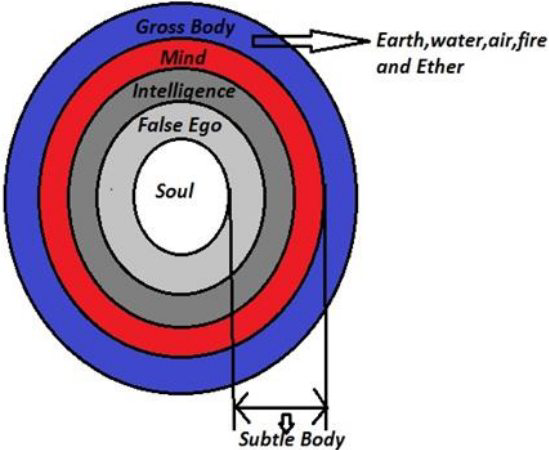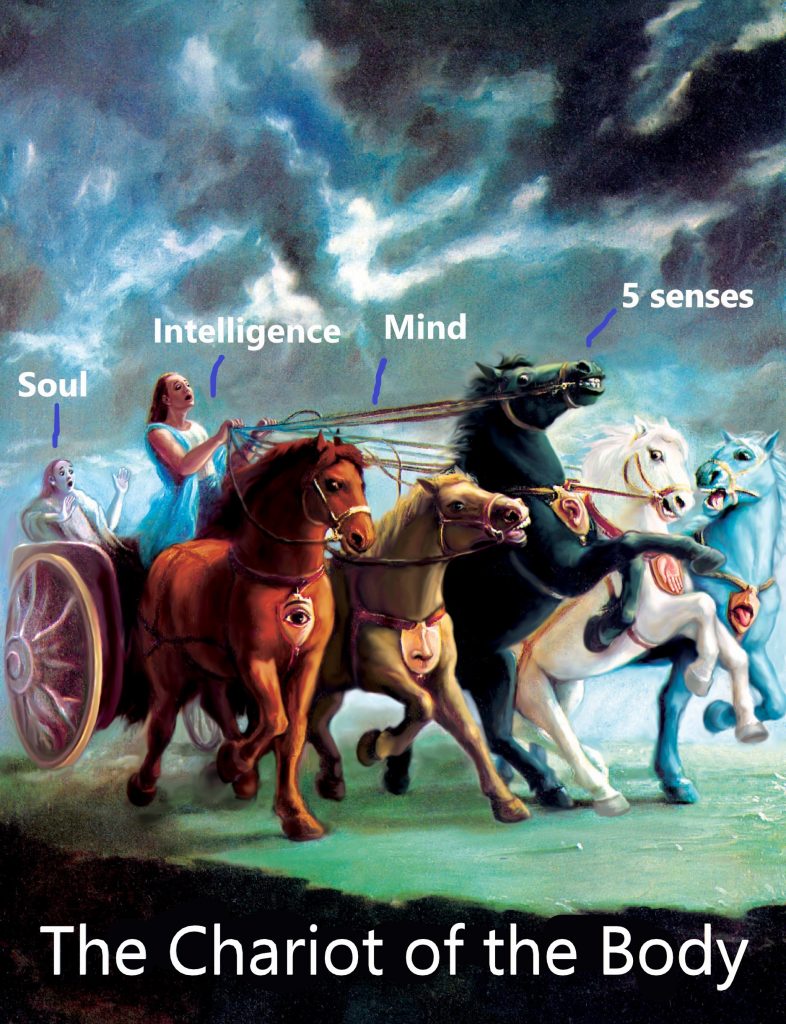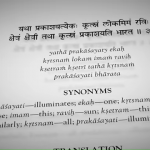What is Consciousness? – Three IIT Kanpur Artificial Intelligence Research Scholars approached Professor Laxmidhar Behera aka Dr. Lila Purushottam Das to have a discussion on consciousness and their whole perception of consciousness changed after that brainstorming discussion. Let’s explore how the discussion went through.
Table of Contents
Can you explain us, What is Consciousness?
This question is the mother of all questions. In Vedanta and Bhagavad Gita, consciousness also refers to Atman or soul. The presence of the soul is known by its symptom called consciousness. In Bhagavad Gita 2.17 Krishna says-
avināśi tu tad viddhi
yena sarvam idaṁ tatam
vināśam avyayasyāsya
na kaścit kartum arhati
That which pervades the entire body you should know to be indestructible. No one is able to destroy that imperishable soul.
This is consciousness, which pervades the entire body. It is further said in Bhagavad Gita that this consciousness is immutable, immovable, un-burnt, un-cut, un-wet and always existing (eternal) but we don’t see such traits anywhere in the physical realm. Our experience says anything can be burnt in no time. This is an experience that is beyond our current experience of physical space and time. Consciousness is a divine experience When situated in consciousness, one becomes freed from ignorance and is situated in knowledge and transcendental joy.
If Consciousness is beyond Space and Time, How can I appreciate this phenomenon of consciousness?
Let us first understand – How do we know what we know? Suppose I am sitting in front of you and I ask you – Where do you see me? Most of you would answer that you see me in front of you but that is wrong. You never see me. All that you are seeing is your own sensory experience carried by light which carries information about my shape and size, dress colour and my location. So, in reality, you are not seeing me but whatever your sensors are telling, you are seeing that. Most of that you consider as knowledge is simply your variegated sensory experiences. Is that clear?
Yes, I understand it now. My biological sensors collect information in terms of light and sound. That creates an experience within by which I become aware of you. Is it Correct?
Yes, True but You have an experience that is mundane (physical) because that experience is created by physical sensory perception, hence, it is material. In our Vedic literature, we call this as a bodily experience but pure consciousness is a divine experience. When I experience my divine self, being situated in self, that experience is pure consciousness. It is difficult to understand that because I have to insulate myself from everything that is physical – both gross and subtle. Self divine has no material dimensions. I have to transcend physical space and time and enter into another realm to understand myself.
What is this bodily experience you talked about?
Suppose you see a table and a chair. How do you make a distinction between these two? You may answer several things but the fact is – the Distinction is because of space. It is because these objects are separated in your visual space you can differentiate between them. An object instantiates an impression in your bodily perceptual space which you call experience. Let’s understand this through an illustrative example-
Mr. X knows how to mimic my voice, so when you hear Mr.X mimicking my voice ( provided you are not seeing Mr.X ), you will experience that I am speaking. So, in the space of sound, my voice and Mr.X mimicking voice occupy the same space. So, in conclusion, there is space, all objects are situated in space and if that space is indistinguishable, you cannot distinguish the objects.
What is space and how is it related to experience?
This is a nice question. I experience an object based on its shape – in my own visual perceptual space just like I experience mango in my perceptual space of taste and rose through perceptual space of smell. The complete experience of any object happens in 5 different spaces – Sound, Touch, Form, Taste, and Smell.

In my experience, every object is made up of space only. Suppose you are bereft of these perceptual spaces then will you have any experience? The Answer is No.
When any object generates a spatial structure in my perceptual space, then we call that experience. Is that all about the bodily experience?
Bodily experience means the experience of an object in my perceptual space but that is not all to bodily experience, because there has to be an experiencer to make the experience meaningful. Who is that experiencer? The human body experiences in different levels from gross to subtle. As per Bhagavad Gita, our experience in gross form happens in five elements – earth, water, fire, air, and ether. These 5 different elements carry 5 different kinds of information about an object. Beyond these gross experiences, we have subtle experiences. The mind is the super-sensory experiencer, so also intelligence, which is higher than the mind, and false ego, which is higher than intelligence.

We have different identities for example- Indian, student, boy, etc and in that level of identity we have experience but all such experiences are physical only.
The Vedic literature provides us an illustrative idea of a living body while comparing to a chariot where the 5 horses represent the 5 senses, chariot driver is the intelligence and the reins, through which driver controls the horses, represents mind, but, Who is the passenger?

That is you, the soul, the consciousness! but because we are always situated in the bodily experience we forget about the passenger, The chariot is meant for the passenger but, in reality, the passenger is forgotten. Let’s continue our discussion to learn more about the passenger.
I am really confused to learn that all our experiences are all part of matter. Then what is the difference between a chair and a human or for that matter any living being? Can chair also have physical experiences?
You are asking a very relevant question- Dead matter (chair) and living matter (body), What is the difference? Have you ever introspected on the difference between living body and the dead body? The modern science says that they are all same physical matter made up of chemicals but our understanding of matter is incomplete
You can call a chair – inert (passive) matter and a living body – an (active) matter. Until now people assigned cognition only to soul ( atman ) but they didn’t realize that this living body has also cognition. A living body consists of different perceptual spaces – (in scientific terms – cognitive physical space) and thus has the capacity to experience. That means matter can experience itself! Have you learnt this anywhere in your scientific curriculum?
This living body is arranged in a specific manner from gross to subtle which makes a living body look different from inert matter and then we take this living body to be the reality.
I see, that you are using the term – Living body instead of Physical body. What exactly is the difference between a living and a dead body?
At the time of death, the subtle body consisting of mind, intelligence, and false ego, gets separated from the physical body. Krishna says in Bhagavad Gita that the subtle body ( Mind, Intelligence, False ego) carries the soul from one gross body to another gross body.
So, What is death? The gross body perishes but the subtle body, still intact, carries you ( the consciousness ) from one gross body to another. The human gross body consists of five elements (spaces). Based on our interactions within this world, these elements take specific shape.
For example, If you grow up in a middle-class Indian family, you would likely prepare for JEE Advanced or NEET. Since, you are born in a specific environment, your bodily arrangement takes a certain shape that propels you to study physics, maths, chemistry whereas one who is born in underworld families, his body take completely different shape( both gross, subtle), So the environment has a significant impact on how your body is shaped
In a nutshell, this material body is a repository of different experiences which we may call as memory – some are short and some are long.
You might not remember something that happened to you yesterday but you might have a memory of something that happened years ago
You mentioned that consciousness is beyond physical experiences. I as an individual feel the pleasure and pain associated with this body. I am able to think and love. Are these attributes of my consciousness?
I can understand your confusion because all the time we consider that the love and care I show and the emotional reciprocations are part of me- the soul, but in reality, all these are part of the body. Whatever we experience is mostly that of bodily consciousness. These experiences are temporary. Thus pleasure and pain are part of body consciousness and hence are physical. Pure consciousness is that which is – sat (eternal), chit (full of knowledge) and ananda (full of Joy). My original consciousness lies beyond my both gross and subtle body. This so-called experiences of pain and pleasure, success and failure- they are not part of me (the soul).
What’s about anesthesia? Does it have anything to do with consciousness?
Anesthesia affects life symptoms, not Consciousness. I do not experience the pain because of being administered with anaesthesia. So anaesthesia affects only bodily experience. As said in the beginning, consciousness can not be suppressed by any means. Consciousness is beyond physical space and time. I, as the conscious being, exist eternally but because of my conditioning with bodily experience, I have a habit of taking my bodily experience to be myself – the divine consciousness. So Anesthesia has nothing to do with the consciousness. Lets see these 2 verses from Bhagavad Gita-
mahā-bhūtāny ahaṅkāro
buddhir avyaktam eva ca
indriyāṇi daśaikaṁ ca
pañca cendriya-gocarāḥ
BG 13.6
icchā dveṣaḥ sukhaṁ duḥkhaṁ
saṅghātaś cetanā dhṛtiḥ
etat kṣetraṁ samāsena
sa-vikāram udāhṛtam
BG 13.7
The five great elements, false ego, intelligence, the unmanifested, the ten senses and the mind, the five sense objects, desire, hatred, happiness, distress, the aggregate, the life symptoms, and convictions – all these are considered, in summary, to be the field of activities and its interactions.
You can see here that bodily desire, hatred, happiness, distress, life symptoms, and convictions are all psycho-physical (a combination of both gross and subtle) and are not part of soul or consciousness. Your liking for a pizza, the happiness you get by watching a movie, the distress you get by loosing near and dear ones, the serenity you feel by watching the morning sun, Your convictions that you are a Hindu, Muslim, Physicist, American, Indian and Your living symptoms- your wakeful state, your sleeping state are just part of the body and have nothing to do with consciousness.
If all my experiences are part of the body than How do I ascertain or experience that there is a soul beyond gross and subtle body?
All living beings have physical experiences such as hunger, sexual desire, fatigue and fear. But all such bodily experiences come to an end as the gross body perishes. But in the human body, one can have divine experience. The human body is so subtly arranged that in a very subtle level you can sense your eternal existence. These divine experiences are eternal – beyond material space and time. The seers of Truth have these experiences. They also educate the sincere seekers on how to achieve these divine experiences.
You have to read and understand Bhagavad Gita under a bonafide spiritual master and you have to practice the principle of consciousness and make your way of life as that of consciousness than only you can understand the consciousness.
What is the outcome of such divine experiences?
You become detached from matter and do not experience lust, greed, anger, envy, and pride even in the presence of agitating objects. You are equally disposed to all living beings and you are full of joy.
Conclusion
Naive understanding that bodily experience is consciousness is incorrect.
The human body has 2 experiences – Mundane and Divine experience. Divine experience is consciousness.




